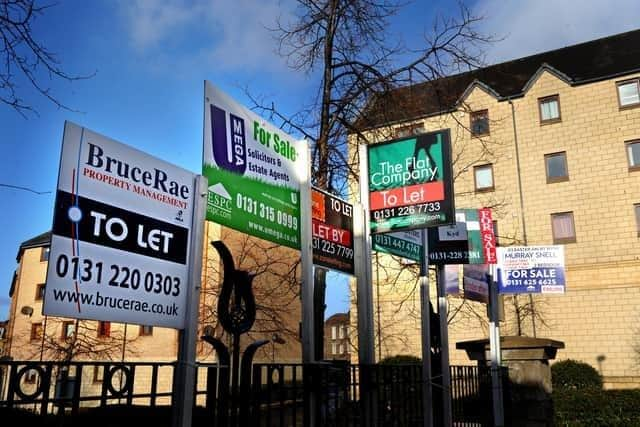Exclusive:Landlords exiting rental market due to ‘hostile political environment’ in Scotland


Increasing numbers of housing landlords are selling up because the Scottish Government has created a “hostile political environment”, a leading property expert has said.
Andrew Diamond, a partner and head of residential property at Edinburgh-headquartered solicitors and estate agents Lindsays, said the private rental market is suffering a double-whammy as investors turn away from buy-to-let and landlords leave the sector.
Advertisement
Hide AdAdvertisement
Hide AdHe said the size of the rental market is “shrinking”, which in turn is “propelling” rent prices. Ministers previously introduced a 3 per cent cap on rent increases for sitting tenants, which is in place until March.


Mr Diamond called for rent caps to be scrapped in next week’s Scottish Budget in order to encourage more supply. He also wants ministers to commit to reviewing the bands, thresholds and rates of Land and Buildings Transaction Tax (LBTT) and the Additional Dwelling Supplement (ADS) to ensure they encourage market activity.
Mr Diamond, who chairs the solicitors’ property collective ESPC, said: “More and more sellers are coming to us with properties they previously rented out because they do not see a future in which they can operate viably and fairly in the current climate.
“I cannot remember the last time I had a purchaser knocking on my door who was buying to let. The vast majority of our dealings with landlords at the moment are disposals or remortgaging.
“I have no doubt that government policy is designed to help tenants, but the clear unintended consequence is that the opposite is true. The size of our rental market is shrinking because institutional investors are taking their business elsewhere, and current landlords are coming to us to sell their properties. This decreasing supply is propelling rent prices. It makes neither social or financial sense to keep digging a hole here.
“The vast majority of housing landlords are decent people providing quality homes. The treatment of the private rented sector by the Scottish Government has been unhelpful, and at times looks antagonistic. Repairing that relationship would benefit landlords, of course, but it would benefit tenants even more. No group of people has been more harmed by the anti-landlord, anti-investor environment than tenants themselves.”
Patrick Harvie, Scotland’s tenants' rights minister, said: “Our emergency legislation has led the way at a time when rents have been rising across the UK, striking an important balance between protection for tenants and the rights of landlords. The most comprehensive up-to-date measure of the overall stock of privately rented properties is the number of properties registered on the Scottish Landlord Register. While there are some limitations to this data, it indicates the number of properties has remained stable since August 2022.
“Since 1 April 2023, private landlords with a tenancy subject to the rent cap have been able to increase a tenant’s rent in-tenancy by up to 3 per cent or can apply to Rent Service Scotland for approval of an increase of up to 6 per cent in specific circumstances. Anywhere else in the UK, private tenants have faced the double impact of uncapped rent rises both during and between tenancies.
Advertisement
Hide AdAdvertisement
Hide Ad“Rental market challenges are being felt across the UK, with interest rates and tax increasing pressure on tenants and landlords. We will introduce a Housing Bill to deliver a new deal for tenants, including the introduction of long-term rent controls for the private rented sector, creating new tenants’ rights and introducing homelessness prevention duties.”
Comments
Want to join the conversation? Please or to comment on this article.
